
The Minister of Health, Hon Kwaku Agyeman Manu has updated Ghanaians on Ghana's preparedness towards the Coronavirus disease 2019 (COVID-19) Outbreak as of 25th February 2020. Writing on his Facebook page, the Minister gave a comprehensive update based on the various thematic areas as recommended by the World Health Organisation (WHO) for COVID 19. The thematic areas included: Coordination, Points of Entry (PoE), Surveillance, Laboratory testing, Case management/Infection Prevention and Control (IPC), Risk Communication / Social Mobilization, Logistics and Partner Support. The update also had key contact persons from the Ministry and Ghana Health Service for further information as:
Dr Badu Sarkodie
[email protected]
Director, Public Health
Ghana Health Service
Dr Da Costa Aboagye
[email protected]
Director Health Promotion
Ghana Health Service
Dr Franklin Asiedu-Bekoe
[email protected]
Head, Disease Surveillance Department
Ghana Health Service
Below is the full update on Ghana's Preparedness of Coronavirus disease 2019 (COVID-19) Outbreak as of 25th February 2020.
Highlights
- The Government of Peoples Republic of China on the 7th January 2020, reported to the World Health Organization (WHO) a confirmed novel corona virus outbreak. The virus has demonstrated efficient human to human transmission and the WHO has declared the outbreak a Public Health Emergency of International Concern (PHEIC).
- Consequently, the WHO requested all member states to strengthen systems for preparedness to prevent importation, ensure early detection and appropriate response to any emergence.
- Using WHO's Country Readiness Checklist, Ghana assessed its capacities to respond to any suspected or confirmed case of COVID-19 and has developed a plan to address identified gaps in respect to preparedness, response and control activities.
- The Government of Ghana has committed 2.8 million Ghana Cedis as initial amount to support Ghana's preparedness.
- Various activities are being undertaken to strengthen systems along the thematic areas of the national strategic plans at the district, regional and national levels. These include Surveillance, Coordination, Laboratory, Points of Entry, Case Management, Social Mobilization and Risk Communication, Logistics and Finance.
- There is capacity in country to test for COVID-19 disease (Noguchi Memorial Institute for Medical research and Kumasi Centre for Collaborative Research).
- As of 27 February 2020, total of 24 suspected cases have been reported and all have tested negative for COVID-19.
- Ghana is classified among 13 Priority-1 countries in WHO Africa region for being at risk, based on flights and passenger volumes.
Ongoing Preparedness Activities
Coordination
The public health emergency (PHEMs) structures
- Public Health Emergency Management Structures have been activated at all levels (national, regional and districts). At the national level, the Emergency Operation Centre (EOC) has met four times following activation.
- Alert has been sent to all regions to update their respective preparedness plan and activate the respective Public Health Emergency Management Committees.
- Stakeholder engagements have been conducted with Ministry of Health / Ghana Health Service (MOH / GHS) involving the GHS Directors at Head Quarters, Regional Directors of Health Services (RDHS); Chief Executive Officers (CEOs) of Teaching Hospitals; Christian Health Association of Ghana (CHAG); Private Sector; National Ambulance Service (NAS); Noguchi Memorial Institute for Medical Research (NMIMR); Kumasi Centre for Collaborative Research (KCCR).
- There have also been meetings with a number of stakeholders: WHO, World Bank, US-CDC, DFID, IOM and other Development Partners.
- The Honourable Minister of Health has met and engaged the Chinese Ambassador to Ghana to enhance information sharing and discuss issues related to the safety, security, and well-being of Ghanaian Nationals in China and also discuss the requisite monitoring /surveillance activities for Chinese Nationals travelling to Ghana.
- The National Technical Coordinating Committee (NTCC) has met twice to plan coordination and other national preparedness activities.
- Monitoring of the national preparedness is being done through the WHO preparedness checklist.
- The national Public Health Emergency Preparedness Plan has been updated and a draft COVID-19 preparedness plan has been developed.
- Alerts on the outbreak have been issued by the Director General (DG) of Ghana Health Service (GHS) and circulated to all regions and districts to initiate preparedness activities and enhance surveillance for respiratory diseases.
- The Director General of Ghana Health Service has held a meeting with all the Regional Directors of Health Services (RDHS) to discuss preparedness activities and planning for the outbreak.
- The Regional Public Health Emergency Management Committees and structures at all levels (national, regional, district) have been activated and on high alert and all the regions have updated their plans.
- The Parliamentarians and Select Committee on Health have been briefed on preparedness activities on two (2) occasions.
Points of Entry (PoE)
- Stakeholder engagements have been held with the Ghana Airport Company Limited (GACL) management, Kotoka International Airport (KIA), Ghana Immigration Services, Customs Division of Ghana Revenue Authority, Tema Port etc. to strengthen COVID-19 preparedness and surveillance systems.
- Screening of passengers on arrival has started and is ongoing using thermal scanning and a health declaration form (HDF).
- Sensitization for points of entry (PoE) staff on surveillance, screening, case detection and Infection Prevention and Control (IPC) has been undertaken for the heads of all the 14 designated points of entry and all the KIA port health staff.
- Holding rooms have been identified at the Kotoka International Airport to be utilized to hold suspected cases of COVID-19 for laboratory testing.
- Alerts and health education on COVID-19 are displayed on airport screens, pull-ups and leaflets available at the KIA arrival and departure halls.
Surveillance
- COVID-19 case definition has been adapted and disseminated to regional and lower levels.
- COVID-19 case investigation form has been adapted and shared with the regions and districts for use.
- National Rapid Response Team (RRT) has been activated.
- National Level Training for Rapid Response Teams and other Health Workers
- on Severe Acute Respiratory Illness (SARI) has been done.
- Training of regional and district Rapid Response Teams have been planned for execution.
- Clinician sensitization (Including the private sector providers) has been conducted.
- Quarantine facility (a newly completed 100 bed hospital) has been identified for potential use.
Laboratory testing
- Testing of suspected cases is ongoing at the Noguchi Memorial Institute for Medical Research with support from WHO, CDC and US Naval Medical Research Unit 3 (NAMRU3).
- Samples from 24suspected cases have been received and tested on at the NMIMR. All the 24 suspected cases have tested negative for COVID-19, and EIGHT (8) tested positive for Influenza.
- Capacity to test for COVID 19 cases has also been established at The Kumasi Centre for Collaborative Research (KCCR) with support from Bernard Nocht Institute.
- Procurement of more reagents & primers for confirmation of COVID-19 cases is ongoing.
- US Government (NAMRU-3, CDC) has provided technical support, funding and diagnostic reagents to NMIMR for testing.
Case management / Infection Prevention and Control (IPC)
- Case management protocols for COVID-19 have been adapted from WHO protocols and disseminated to the regions for further dissemination to the districts and facilities.
- Greater Accra Regional (Ridge) hospital and Tema General Hospitals have been designated as treatment /Isolation centres.
- Technical support visits have been undertaken by the Institutional Care Division (ICD) of Ghana Health Service and WHO to the designated facilities to asses IPC measures, logistics, etc.
- Staff at the two identified treatment centres (Tema and Ridge hospitals) have undergone preliminary training in case management and IPC.
- Four other facilities (Ga East, Police, LEKMA and Korle-Bu Teaching Hospitals) have been identified as additional facilities to support case management.
Risk Communication / Social Mobilization
- Media briefing has been conducted on preparedness activities by the Ministry of Health / Ghana Health Service.
- Key messages and educational materials on COVID-19 preparedness and preventive measures have been developed and disseminated.
- Preventive messages on COVID-19 and related instructions for passengers have been developed and are being broadcast on the Kotoka International Airport screens.
- Four (4) press releases on COVID-19 have been issued by the Minister of Health / Ghana Health Service providing:
- Information on evolution of the outbreak globally, clinical symptoms, directions on prevention and measures being taken within the country to early detect and manage possible cases.
- Updates on the country's preparedness activities and on cases suspected and tested for COVID-19
- Radio and television discussions and engagements on the outbreak and Ghana's preparedness activities have been started and are ongoing.
- Jingles have been developed for public education in the regions and districts
- Daily updates are being given.
Logistics
Five thousand (5,000) PPEs have been provided by the government and distributed to all regions, PoE, Teaching Hospitals, and treatment centres and selected health facilities and other frontline facilities.
Partner Support
The country has been working in close collaboration with partners (WHO, World Bank, US-CDC, UNICEF, Red Cross etc.) who are supporting by providing technical, logistic and financial support.
The WHO has
- Donated PPEs valued at $5,000 to the GHS.
- Shared WHO COVID-19 guidelines and tools on surveillance, points of entry, case management, laboratory protocols, risk communication.
- Provided laboratory supplies to support sample collection and testing.
US Government (NAMRU-3, CDC, USAID)
- Provided technical support, funding and diagnostic reagents to NMIMR for testing.
- Supported in development and printing of social and behaviour change communication materials and training.
DFID
Support for case management technical assistance.
Contacts
For further information please contact:
Dr Badu Sarkodie
[email protected]
Director, Public Health
Ghana Health Service
Dr Da Costa Aboagye
[email protected]
Director Health Promotion
Ghana Health Service
Dr Franklin Asiedu-Bekoe
[email protected]
Head, Disease Surveillance Department
Ghana Health Service





 Meta releases new version of conversational AI across its platforms
Meta releases new version of conversational AI across its platforms
 Cape Town named Africa’s Best Airport 2024 by Skytrax
Cape Town named Africa’s Best Airport 2024 by Skytrax
 Bono East: Four injured after hearse transporting corpse crashes into a truck
Bono East: Four injured after hearse transporting corpse crashes into a truck
 ‘Be courageous, find your voice to defend our democracy’ — Sam Jonah urges journ...
‘Be courageous, find your voice to defend our democracy’ — Sam Jonah urges journ...
 Exodus of doctors, nurses and teachers have worsened because of unserious Akufo-...
Exodus of doctors, nurses and teachers have worsened because of unserious Akufo-...
 2024 election: Avoid insults, cutting down people in search of power – National ...
2024 election: Avoid insults, cutting down people in search of power – National ...
 ‘You passed through the back door but congratulations’ — Atubiga on Prof Jane Na...
‘You passed through the back door but congratulations’ — Atubiga on Prof Jane Na...
 Government’s $21.1 billion added to the stock of public debt has been spent judi...
Government’s $21.1 billion added to the stock of public debt has been spent judi...
 Akufo-Addo will soon relocate Mahama’s Ridge Hospital to Kumasi for recommission...
Akufo-Addo will soon relocate Mahama’s Ridge Hospital to Kumasi for recommission...
 We must not compromise on our defence of national interest; this is the time to ...
We must not compromise on our defence of national interest; this is the time to ...
